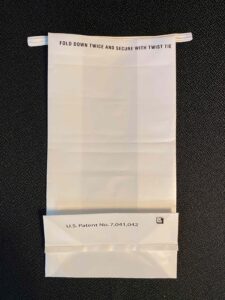
Recently, I was traveling on Something-or-other Airlines, (as I often do), and noticed the barf bag in my seat pocket was patented.
It was quite a large marking, too.
“Huh,” I thought. I have to look this one up on Google. So, here it is:
Method for making a seamless plastic motion discomfort receptacle
Abstract
A plastic motion sickness receptacle is disclosed having a seamless perimeter defined by a tubular member folded at a first closed end, and an open end including means for closing the receptacle after use. The plastic tubular member comprises integrally formed walls that terminate in a base at said closed end with the edges of the walls cooperating to form a fluid-tight relationship. An outer surface of the receptacle includes indicia printed thereon including instructions for using the bag upon the occurrence of motion sickness.[1]
First, I’m glad “the edge of the walls,” “cooperate” when they are “form(ing) a fluid-tight relationship.” I wouldn’t want my barf bag walls to be uncooperative if I ever needed to use it. So thank you to Louis Chertkow and Pam Pananon for inventing something…this thing that has a plastic tubular member…
Also, in case you were wondering, this “methodology” was granted a patent on August 28, 2012. So there were 15,749 days between landing on the moon and the invention of this particular barf bag. Seems like a long time to me? (Are there other patented barf bags? I have so many questions…)
So how does all this barfing relate to risk and compliance? I’m glad you asked.
On October 5, 2023, the Consumer Financial Protection Bureau (CFPB) announced it’s plan to hire fifty (50%) percent more enforcement attorneys and support staff. CFPB Director Rohit Chopra has allocated about 75 new full-time employees to the enforcement division, according to an internal memo from Eric Halperin, the CFPB’s enforcement chief. The CFPB has roughly 150 enforcement attorneys and support staff. The hiring is one of the largest recruitment drives at the agency.
“These additional resources will enable us to open more investigations, including matters with significant market impact and against large market actors, consistent with the Bureau’s priorities,” Halperin wrote in the memo. “We also will be in a better position to meet resource demands from our increasing number of matters in contested litigation.”[2]
Many expect the enforcement actions will fall under the federal prohibition against “unfair, deceptive and abusive acts and practices,” known as UDAAP.
Enforcement is on the rise both on the state and the federal level. Here are a few other recent examples.
The Alaska Attorney General (AG) filed a consumer protection lawsuit against Swickard Auto Group (who has forty-two (42) stores) according to Automotive News.[3]
The suit stems from three (3) customer complaints. They allege Swickard advertised cars it didn’t have and didn’t honor advertised prices and interest rates.[4] In one of the cases, the customer happened to be an investigator with Alaska’s Department of Law. The sales agent told him the e-commerce team may have falsely advertised inventory to help drive foot traffic to the store.[5]
(Are you seeing why I started with the barf bag references?)
Next, a New Mexico dealership, Reliable Chevrolet (big irony coming…) was fined $2.5 million in punitive damages and $87,000 in compensatory damages for “unfair practices and spot delivery violations.”[6]
The customer had $12,000 of negative equity. While the dealership was trying to get the deal approved, the dealership missed two (2) loan payments on two (2) trade-ins and the customer’s credit score dropped 126 points. As a result, the customer had a “consolidation loan denied, and then he also got a credit limit decreased on one of his credit cards. He ended up having to cancel his plans to move…”[7] According to the article, instead of trying to fix the problem, Reliable took the case to court which took more than two (2) years. I don’t know “Reliable’s” side of the story, but it certainly seems like an air sickness moment, wouldn’t you say?
So how do you protect your dealership from hurl, throw up, spew, retch, heave, and vomit? (I know it’s gross but I am trying to make a point.) Barf bags won’t help you here, as they only catch the regurgitation. How can you avoid the barf bag in the first place? Consider having clear, written policies which are signed by all employees so there is no ambiguity or room for interpretation. You can fix a mistake from a “rogue” employee if they are not following your corporate standards. If you have unaddressed systemic problems, then you can certainly expect to cough up some of your dough. #seewhatIdidthere
[1] https://patents.google.com/patent/US7041042B2/en
[2] https://www.nationalmortgagenews.com/news/cfpb-plans-to-hire-50-more-enforcement-attorneys-support-staff
[3] Automotive News “Alaska attorney general files consumer protection lawsuit against Swickard Auto,” August 12, 2023, by Julie Walker.
[4] Automotive News “Alaska attorney general files consumer protection lawsuit against Swickard Auto,” August 12, 2023, by Julie Walker.
[5] Automotive News “Alaska attorney general files consumer protection lawsuit against Swickard Auto,” August 12, 2023, by Julie Walker.
[6] Automotive News “New Mexico dealership on the hook for millions in fraud case,” September 21, 2023, by Paige Hodder
[7] Automotive News “New Mexico dealership on the hook for millions in fraud case,” September 21, 2023, by Paige Hodder

Leave A Comment